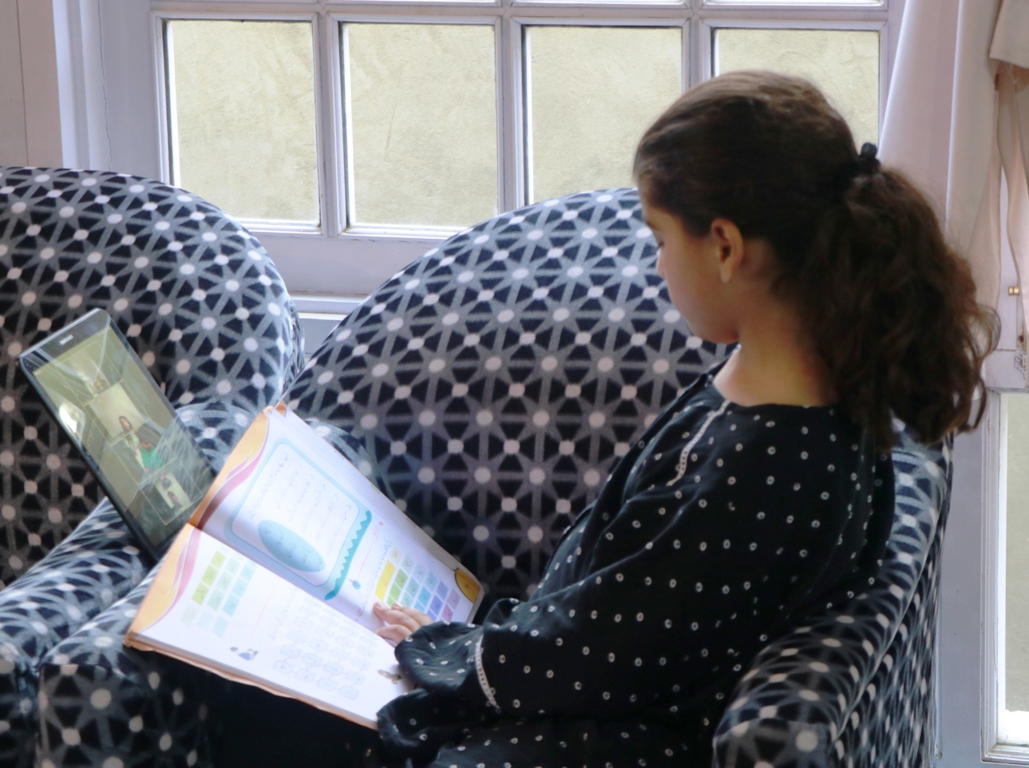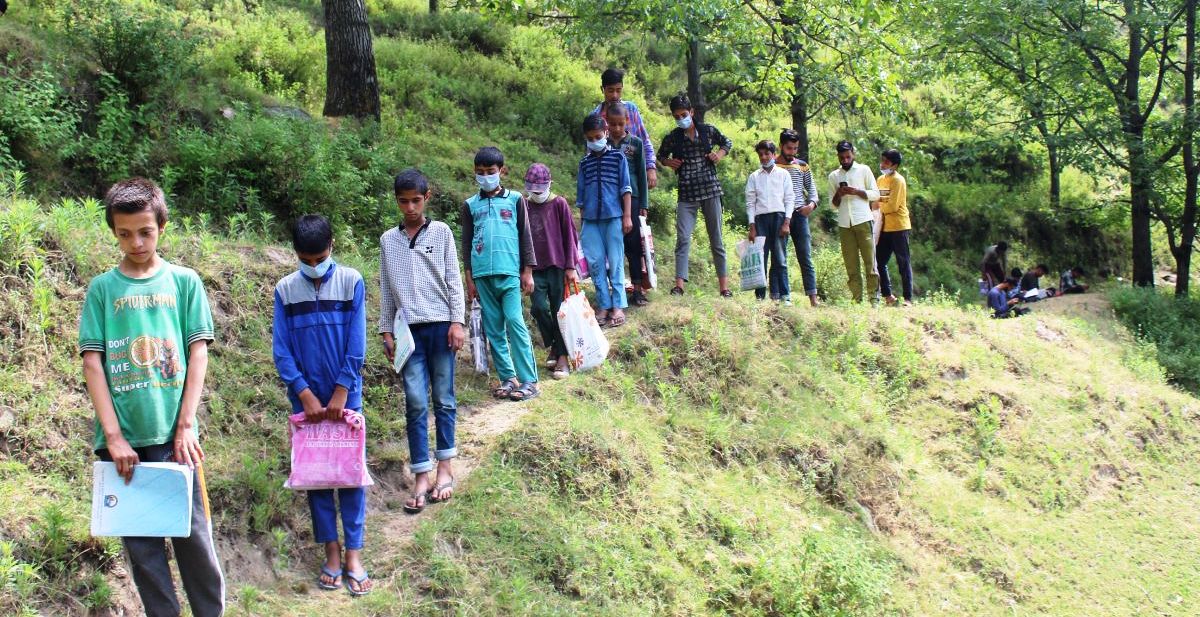As Covid19 pushed the world towards the tiny phone screens, it has started severely impacting the new generation. Zakia Qurashi talks to experts to offer an idea of the consequences

Ahsan, 11, is sitting in a room, his eyes keenly focused on the mobile screen, which doubles as a virtual playground for him. The first thing he grabs upon opening his eyes in the morning is his phone. Even without washing his face and having a proper breakfast, he picks it to play the game from where he left off the previous night, clinging all day to the charging socket. This is his routine.
Just like Ahsan, Mujeeb, 9, also has only one constant in life, his mobile phone. His day starts and ends with his phone. “There’s only one thing he is worried about; the battery percentage of his phone,” his father said. “His life revolves around it.”
Such has been Mujeeb’s addiction that his father had to activate parental controls on the phone to reduce his screen time. He even quarrels with his parents when asked to put the phone down, throws tantrums or refuses to eat.
“His screen time was more than 12 hours. I have now locked it at three hours per day out of which he has to attend online classes for 1.5 hours,” the concerned father said. “Rest of the time, he plays games,” his father added.
Mujeeb bargains with his father to get some extra time, offering to study a little more in exchange for an additional half an hour with his phone. But, his father said his efforts at study are very half-hearted, he just waits to get back to his phone.
6 x 4 Companion
His contact with the outside world is very little and he rarely goes outside to play. Instead, he prefers to spend time with his 6 x 4-inch companion within the four walls of his room. To Mujeeb, studying is boring and playing outside tires him out. Apparently, he loves football but refuses to play because he says that it exhausts him. “I have pain in my legs at night,” he complains.
His father even got him table tennis to get him to do some physical activity. But Mujeeb said he doesn’t want to play because he loses the game frequently. Due to the constant exposure to screens, Mujeeb’s vision has also been greatly impacted. Doctors have even given him heavy power eyeglasses to wear.

Influenced by his friend’s decision, he has also started his own YouTube channel and now flaunts it very proudly. “I have a friend. He created his YouTube channel. I thought if he could, why can’t I. Now, I have more subscribers than him, 39,” he said, grinning.
Sameen and Tafheem’s story is no different. They are two brothers separated by two years. Sameen is 13, and Tafheem 11. Their father said that their screen time increased after schools were shut due to the lockdown. “They had no work to do. No school, no homework. They started playing games to kill their time and within a short period were addicted to them,” The concerned father said, insisting they have forgotten what it means to play outside. “They are least involved in the physical activities.” However, online, they play a lot of games – you name it, they play it.
For Sameen and Tafheem, the virtual world is the real one. Their father said that it has affected their performance. “Their retention capacity, their memory power, writing, everything has been affected. They don’t remember things.”
While there is no denying that technologies have some proven benefits but it also has an impact on a child’s overall well-being and development.
Expert Advice
Wasim Kakroo, a clinical psychologist, said that excessive exposure to screens can affect a child’s emotional, social and mental intelligence. “Depending on the age, we can divide or categorize this impact. If the child is small and the exposure to the screen is long, it impacts the child’s brain, especially the frontal lobe that is responsible for rational thinking and consequences of doing or not doing things,” Kakroo said.
Besides, chronic and excessive exposure to screen doesn’t allow the development of “social quotient” and “emotional quotient” in a child. “These are very important aspects of being successful in today’s life and it is only possible when a child will socialize in the real world instead of the virtual world.”
Two Hours A Day
Kakroo said that two hours of screen exposure in a day is more than enough and should be distributed throughout the day. Exposure to screen causes “screen addiction” and can lead to different disorders. “Naturally a child has a need to get connected and when a parent doesn’t fulfil that need it affects their emotional quotient and can lead to emotional disorders. Instead of creating a social connection, they create a virtual connection.”
Other disorders caused by excessive use of technologies are; depression, anxiety disorders, emotional disorders, sociological disorders and Attention-deficit/hyperactivity disorder (ADHD). ADHD is a behavioural condition that makes focusing or getting organized very challenging.
Quick Gratification Impulses
Kakroo remarked that due to technology, children are used to quick gratification impulses. “The more a child is exposed to technologies the quicker his/her gratification impulses get. It causes intolerance. They don’t learn to stick to something and get bored easily.”
To be successful, Kakroo asserted it is important to have delayed gratification of impulses. “The more a person is able to delay the gratification of pleasures or impulses the more successful he/she can be.”
Citing the example of games, Kakroo said that real-time games can help a child to become patient, honest and disciplined. “It creates self-awareness, empathy and social bonds/connections. It increases the social and emotional quotient of the child.” He further argued that virtual games cannot teach a child all this because one click can change the entire game. “In a virtual game if a child feels like he is losing he can restart the game or switch to other things. Screen exposure does not allow you to become emotionally intelligent because for that you need a sort of assertiveness and teamwork.”
He further added that virtuality doesn’t allow a child to handle the pain of waiting for something or deal with the negative emotions that come along.
Kakroo asserted that more exposure to screens can make a child unorganized, impulsive, impatient and inattentive. It can also affect their goal sustenance, the ability of decision making and time management. “The more it is experienced in childhood, the more it becomes the philosophy of life. This can also affect the priorities of life.”
Although Kakroo acknowledged the lack of playgrounds and playing spaces as one of the reasons for sticking to the screen, he also talked about the role parents play in structuring this behaviour in a child. “With the advent of these gadgets, parents find it as an easy tool to handle their children. They don’t have time to engage their children in real-time activities. They don’t establish that bond with their children that can make them cooperative.”
He said that parents can involve their children in different activities at home. They should have that understanding or sensitivity of the child’s world that is different from their world.
Dopamine Release
Kakroo opined that tech addiction is like any other drug addiction and engages the same neuronal tract that is used in drug addictions. “At a molecular level, drugs and technology work the same way. They are addictive and release dopamine in your brain and hence make you addicted to it.”
He further explained that it causes satiation. “A point reaches when the child becomes bored with the same stuff and the search for the new stuff can even lead to porn addiction.”
Kakroo implored parents to engage with their children and understand their world. “They need to understand their needs, especially their emotional needs. A parent should give age-appropriate reinforcements to their children so that they enjoy engaging in those activities,” he said. “Only one hour of a technology-free world can make a difference.”
Destroyed Childhood
More importantly, experts say that technology has destroyed the essence of childhood and also hampered their chances of integrating into society. Dr Suheel Rasool Mir, a research scholar of Sociology at the University of Kashmir said that the pattern of communication between children and parents has undergone tremendous change. The children are disconnected from the physical realities.
“Children are out of touch with regard to physical realities, for example, if you ask children to tell the names of their cross cousins, they will not be able to recall but if you ask them to name the cartoon characters they are so sharp to tell names because there is a constant contact between children and technology,” Mir said.
Mode of Socialization
Mir said that the mode of socialization has changed and is now technology-based.
“It creates a sort of intolerance among children. They are not willing to integrate themselves into mainstream society and this will affect their daily life,” he said. “When there is constant consumption or overconsumption of technology it ultimately leads towards children’s disintegration with the society.”
He argued that earlier the socialization of a child used to start in the family or from the mother’s lap but now after just three months of its birth, the child asks for a phone. “Immediate points of contact have changed from family to gadgets. Technology has replaced the role of parents.”
Optimum Use
Mir said that optimum use of technology is good but when it is beyond the optimum threshold it is cancerous for a child’s personal development. “To my understanding, the children will develop anxieties from the very preliminary stage and at point, these anxieties can turn into suicidal tendencies and create a depressing environment.”
In 2020, a horrible incident came forth when a 13-year-old boy from Pulwama committed suicide because his younger brother refused to give him a mobile phone for playing PUBG.
Mir added that technology impacts a child’s health be it physical, mental or social health. “Children will create so many layers of anxieties and later on, a stage will come that they will not be able to come out of these anxieties because they are not in contact with the physical (real) world. They create their own online world where they interact with strangers. This will impact their ability to integrate and socialize in society.”
He further said that earlier when children used to be hungry they used to call their mother but now they are not hungry for food but hungry for phones. “They have lost their appetite.”















